![]()
| Then And Now |
|
![]()
A new CD by the Stooges doesn't reach the unhinged heights of their three classics.
by Dalton Ross in Entertainment Weekly
 The Stooges
The Stooges
The Stooges
(1969, Elektra)
Fun House
(1970, Elektra)
Raw Power
(1973, Columbia)
The Weirdness
(2007, Virgin)
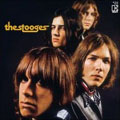
![]() istory is littered with once-vital rock acts whose reunion efforts couldn't come close to capturing the oomph of the original recordings. So let's take a look at Iggy Pop's seminal pre-punk outfit, the Stooges, who are back with a new album titled The Weirdness. When other bands of the late '60s/early '70s were busy singing about peace, love, and understanding, Iggy was out to search and destroy. He smeared peanut butter all over himself and crooned about being someone's mutt -- all pretty outlandish stuff. The band's 1969 self-titled debut was a tad uneven, with some filler (the 10-minute "We Will Fall") and songs that sounded suspiciously familiar ("1969" and "Little Doll" are pretty much the exact same tune), but its nihilistic high points ("No Fun," "I Wanna Be Your Dog") planted the seeds of a musical revolution.
istory is littered with once-vital rock acts whose reunion efforts couldn't come close to capturing the oomph of the original recordings. So let's take a look at Iggy Pop's seminal pre-punk outfit, the Stooges, who are back with a new album titled The Weirdness. When other bands of the late '60s/early '70s were busy singing about peace, love, and understanding, Iggy was out to search and destroy. He smeared peanut butter all over himself and crooned about being someone's mutt -- all pretty outlandish stuff. The band's 1969 self-titled debut was a tad uneven, with some filler (the 10-minute "We Will Fall") and songs that sounded suspiciously familiar ("1969" and "Little Doll" are pretty much the exact same tune), but its nihilistic high points ("No Fun," "I Wanna Be Your Dog") planted the seeds of a musical revolution.
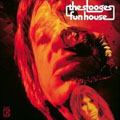
 Filled with Iggy's random yelping and Ron Asheton's buzz-saw guitar, the band's follow-up, 1970's Fun House, was quite simply one of the dirtiest, grimiest, and most sweat-stained albums ever. It's hard now to appreciate just how radical this record was upon its release, but suffice to say it's not often you hear a lead singer coughing over the music, as Iggy does on "T.V. Eye." The album felt primal, unpredictable, dangerous. It still does (in 2000, Rhino Handmade released a limited-edition seven-disc boxed set documenting the entirety of the recording sessions for the album -- including plenty of studio chatter and 28 takes of "Loose").
Filled with Iggy's random yelping and Ron Asheton's buzz-saw guitar, the band's follow-up, 1970's Fun House, was quite simply one of the dirtiest, grimiest, and most sweat-stained albums ever. It's hard now to appreciate just how radical this record was upon its release, but suffice to say it's not often you hear a lead singer coughing over the music, as Iggy does on "T.V. Eye." The album felt primal, unpredictable, dangerous. It still does (in 2000, Rhino Handmade released a limited-edition seven-disc boxed set documenting the entirety of the recording sessions for the album -- including plenty of studio chatter and 28 takes of "Loose"). 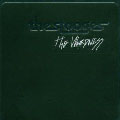 Even with a rejiggered lineup and piss-poor David Bowie production, 1973's Raw Power contained enough dirgy anthems ("Gimme Danger," "Your Pretty Face Is Going to Hell") to cement the Stooges' reputation as the forefathers of punk. They were a band that never sold a lot of records, but they mattered. The Weirdness, the group's first full-length release in 34 years, may not do either.
Even with a rejiggered lineup and piss-poor David Bowie production, 1973's Raw Power contained enough dirgy anthems ("Gimme Danger," "Your Pretty Face Is Going to Hell") to cement the Stooges' reputation as the forefathers of punk. They were a band that never sold a lot of records, but they mattered. The Weirdness, the group's first full-length release in 34 years, may not do either.
Asheton can still manufacture some cutting, blues-drenched riffs, most notably on "Trollin'" and "ATM," but he now seems to be playing his guitar less as a weapon and more as -- gasp! -- an instrument. And while Iggy has never been a master lyricist -- his simplicity, such as chanting "I feel alright!" about 312 times in a row, has always been his charm -- there are several stanzas ("She wore some short shorts, man, she filled them out/ These bodies only come from way down South") that come off more corny than minimalist. There are certainly moments on The Weirdness that rock. A few of these new Stooges songs may even cause you to stand up and take notice. The difference is, the old ones make you duck for cover. The Stooges: B+, Fun House: A+, Raw Power: A-, The Weirdness: B- ![]()

| Wonder Broad |
|
![]()
Bea Arthur, liberal politics, and biting humor. A '70s TV tough girl still gets the last laugh.
by Ken Tucker in Entertainment Weekly
Maude
Season 1
Beatrice Arthur, Bill Macy
Unrated, 572 mins., 1972-73
(Sony Pictures Home Entertainment)
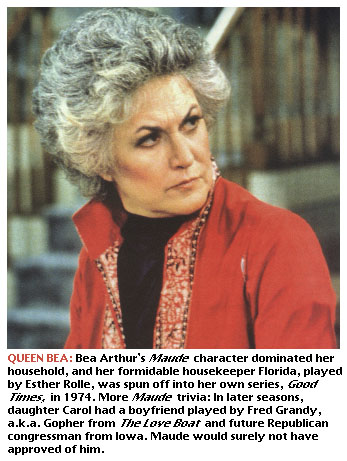
![]() atching old TV sitcoms on DVD can be disappointing: The best jokes that once were fresh have been recycled so frequently in later series that they seem now, unfairly but undeniably, stale. The shows that dealt with topical matters fare even more poorly -- who wants to guffaw about Richard Nixon or leisure suits now?
atching old TV sitcoms on DVD can be disappointing: The best jokes that once were fresh have been recycled so frequently in later series that they seem now, unfairly but undeniably, stale. The shows that dealt with topical matters fare even more poorly -- who wants to guffaw about Richard Nixon or leisure suits now?
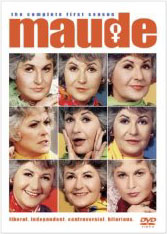 Maude, whose first, 1972-73 season is now on three DVD discs with no extras, is a glorious exception. Here, every episode, taped in front of a studio audience, is like a complete play clocking in at a little over 20 minutes. The laughs generated by Beatrice Arthur's Maude are sometimes so loud and long that the actress has to do that stage-freeze thing, standing motionless until her next line can be heard.
Maude, whose first, 1972-73 season is now on three DVD discs with no extras, is a glorious exception. Here, every episode, taped in front of a studio audience, is like a complete play clocking in at a little over 20 minutes. The laughs generated by Beatrice Arthur's Maude are sometimes so loud and long that the actress has to do that stage-freeze thing, standing motionless until her next line can be heard.
A spin-off of All in the Family (Maude was Edith Bunker's liberal, upper-middle-class cousin -- i.e., the anti-Archie), Maude was a prime example producer Norman Lear's comedy empire of that era, with old-fashioned gag structures juiced by timely, often controversial references. Like Archie Bunker, Maude is an intimidating powerhouse: She's brayingly noisy, not to mention taller than her husband, Walter (the breezy Bill Macy), and her grown daughter, Carol (the stiff but charming Adrienne Barbeau).
Maude's topical humor retains its bite. Other '70s TV shows dealt with the rise of black power, but only on Maude would the title character host a fund-raiser for "one of the most important black militant leaders in the country." And Maude is now startlingly un-PC: She calms down her rattled nerves in that episode by downing "two Miltown, the greatest tranquilizer known to man," and following them with a Valium and a glass of scotch.
By far the most controversial episodes of Maude occur in this first season: the two-parter "Maude's Dilemma." When it aired in November 1972 -- months before the Roe v. Wade ruling -- Maude was the first TV character to choose abortion (it was then legal in New York, where Maude resided). The teleplay by Susan Harris, who would go on to create Arthur's next sitcom, The Golden Girls, is a fascinating mixture of frankness and fudging. While Carol, the show's mouthpiece for feminism, argues for the procedure and points out that for Maude at age 47, pregnancy could be risky, "Maude's Dilemma" spends most of its time on comic subplots such as Walter's fear of getting a vasectomy. The decision is made in the final moments of the second episode. Walter reassures Maude she's chosen the right option. They hug and credits roll. The subject is never referred to in the next episode. It's one of the few times Maude is vulnerable; it's also one of the few times Maude is so subtle it seems timid. B+ ![]()
![]() Reader's Comments
Reader's Comments
No comments so far, be the first to comment.
